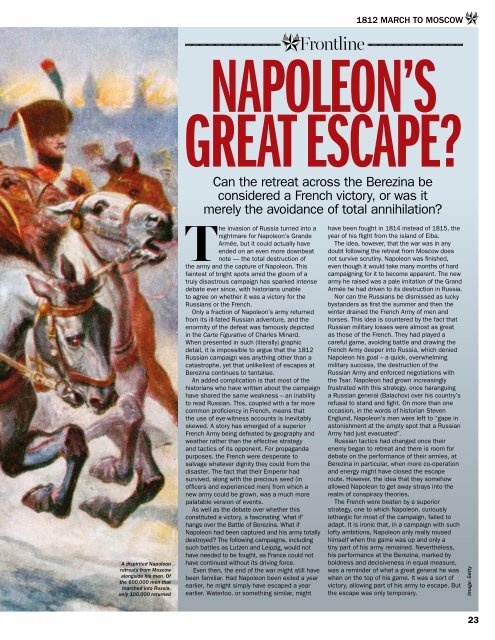You also want an ePaper? Increase the reach of your titles
YUMPU automatically turns print PDFs into web optimized ePapers that Google loves.
Frontline<br />
1812 MARCH TO MOSCOW<br />
NAPOLEON’S<br />
GREAT ESCAPE?<br />
Can the retreat across the Berezina be<br />
considered a French victory, or was it<br />
merely the avoidance <strong>of</strong> total annihilation?<br />
A dispirited Napoleon<br />
retreats from Moscow<br />
alongside his men. Of<br />
the 600,000 men that<br />
marched into Russia,<br />
only 100,000 returned<br />
The invasion <strong>of</strong> Russia turned into a<br />
nightmare for Napoleon’s Grande<br />
Armée, but it could actually have<br />
ended on an even more downbeat<br />
note — the total destruction <strong>of</strong><br />
the army and the capture <strong>of</strong> Napoleon. This<br />
faintest <strong>of</strong> bright spots amid the gloom <strong>of</strong> a<br />
truly disastrous campaign has sparked intense<br />
debate ever since, with historians unable<br />
to agree on whether it was a victory for the<br />
Russians or the French.<br />
Only a fraction <strong>of</strong> Napoleon’s army returned<br />
from its ill-fated Russian adventure, and the<br />
enormity <strong>of</strong> the defeat was famously depicted<br />
in the Carte Figurative <strong>of</strong> Charles Minard.<br />
When presented in such (literally) graphic<br />
detail, it is impossible to argue that the 1812<br />
Russian campaign was anything other than a<br />
catastrophe, yet that unlikeliest <strong>of</strong> escapes at<br />
Berezina continues to tantalise.<br />
An added complication is that most <strong>of</strong> the<br />
historians who have written about the campaign<br />
have shared the same weakness – an inability<br />
to read Russian. This, coupled with a far more<br />
common pr<strong>of</strong>iciency in French, means that<br />
the use <strong>of</strong> eye-witness accounts is inevitably<br />
skewed. A story has emerged <strong>of</strong> a superior<br />
French Army being defeated by geography and<br />
weather rather than the effective strategy<br />
and tactics <strong>of</strong> its opponent. For propaganda<br />
purposes, the French were desperate to<br />
salvage whatever dignity they could from the<br />
disaster. The fact that their Emperor had<br />
survived, along with the precious seed (in<br />
<strong>of</strong>ficers and experienced men) from which a<br />
new army could be grown, was a much more<br />
palatable version <strong>of</strong> events.<br />
As well as the debate over whether this<br />
constituted a victory, a fascinating ‘what if’<br />
hangs over the Battle <strong>of</strong> Berezina. What if<br />
Napoleon had been captured and his army totally<br />
destroyed? The following campaigns, including<br />
such battles as Lutzen and Leipzig, would not<br />
have needed to be fought, as France could not<br />
have continued without its driving force.<br />
Even then, the end <strong>of</strong> the war might still have<br />
been familiar. Had Napoleon been exiled a year<br />
earlier, he might simply have escaped a year<br />
earlier. Waterloo, or something similar, might<br />
have been fought in 1814 instead <strong>of</strong> 1815, the<br />
year <strong>of</strong> his flight from the island <strong>of</strong> Elba.<br />
The idea, however, that the war was in any<br />
doubt following the retreat from Moscow does<br />
not survive scrutiny. Napoleon was finished,<br />
even though it would take many months <strong>of</strong> hard<br />
campaigning for it to become apparent. The new<br />
army he raised was a pale imitation <strong>of</strong> the Grand<br />
Armée he had driven to its destruction in Russia.<br />
Nor can the Russians be dismissed as lucky<br />
bystanders as first the summer and then the<br />
winter drained the French Army <strong>of</strong> men and<br />
horses. This idea is countered by the fact that<br />
Russian military losses were almost as great<br />
as those <strong>of</strong> the French. They had played a<br />
careful game, avoiding battle and drawing the<br />
French Army deeper into Russia, which denied<br />
Napoleon his goal – a quick, overwhelming<br />
military success, the destruction <strong>of</strong> the<br />
Russian Army and enforced negotiations with<br />
the Tsar. Napoleon had grown increasingly<br />
frustrated with this strategy, once haranguing<br />
a Russian general (Balachov) over his country’s<br />
refusal to stand and fight. On more than one<br />
occasion, in the words <strong>of</strong> historian Steven<br />
Englund, Napoleon’s men were left to “gape in<br />
astonishment at the empty spot that a Russian<br />
Army had just evacuated”.<br />
Russian tactics had changed once their<br />
enemy began to retreat and there is room for<br />
debate on the performance <strong>of</strong> their armies, at<br />
Berezina in particular, when more co-operation<br />
and energy might have closed the escape<br />
route. However, the idea that they somehow<br />
allowed Napoleon to get away strays into the<br />
realm <strong>of</strong> conspiracy theories.<br />
The French were beaten by a superior<br />
strategy, one to which Napoleon, curiously<br />
lethargic for most <strong>of</strong> the campaign, failed to<br />
adapt. It is ironic that, in a campaign with such<br />
l<strong>of</strong>ty ambitions, Napoleon only really roused<br />
himself when the game was up and only a<br />
tiny part <strong>of</strong> his army remained. Nevertheless,<br />
his performance at the Berezina, marked by<br />
boldness and decisiveness in equal measure,<br />
was a reminder <strong>of</strong> what a great general he was<br />
when on the top <strong>of</strong> his game. It was a sort <strong>of</strong><br />
victory, allowing part <strong>of</strong> his army to escape. But<br />
the escape was only temporary.<br />
Image: Getty<br />
23


















